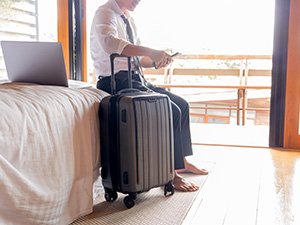
Another day, another cyber-attack! Just last month, Omni Hotels & Resorts was the victim of a cyber-attack that led to a company-wide outage. The company took immediate action and brought the entire network offline to pinpoint the issue, protect its data, and prevent further damage from occurring. Unfortunately, this process heavily affected the hotel’s operations and day-to-day functions, such as managing reservations and using credit and debit cards in restaurants and shops within the hotel. Some estimates expect this attack to cost the Omni over a million dollars.
While most customers were aware of the inconveniences of the Omni outage, many were not aware of the dangers. When a network is compromised, unless you have high-grade tools to protect you, every device you connect to is put at risk. When you are traveling, it is important to treat everything like a risk to ensure your safety. Protecting your personal data is crucial to safeguard your privacy and prevent unauthorized access. Here are some tips to help you keep your information secure:
- Don’t connect to the public Wi-Fi in the hotel: Truthfully, this also applies to coffee shops, airport lounges, etc. If a network is compromised and you connect to it, you could be giving hackers access to your devices.
- Turn off the auto-connect feature: Even if you don’t actively connect to the hotel’s Wi-Fi, if a hacker has set up a fake Wi-Fi network and your device auto-connects to it, that could be a big problem. Shut the feature off and only manually connect to sources you trust.
- Use your phone’s hotspot: Instead of connecting to public Wi-Fi, most cell phones come equipped with a hotspot that allows your other devices to connect to your phone’s internet. If not, one call to your wireless provider can often add this feature.
- Update Your Devices: Ensure that your phone, laptop, and other devices have the latest software updates. These updates often include security patches that address vulnerabilities.
- Avoid Public Charging Stations: Public charging stations may have hidden malware or compromised USB ports. Instead, carry your own portable charger or use a wall outlet.
- Enable Multi-Factor Authentication (MFA): Enable MFA for your email, social media, and other accounts. This adds an extra layer of security by requiring multiple verification steps.
- Backup Your Data: Regularly back up your phone, laptop, and other devices. If your device is lost or stolen, you will still have access to your important files.
- Lock Your Devices: Set up strong passwords, PINs, or biometric locks on your devices. If your phone or laptop gets stolen, it will be harder for someone to access your data.
These tips will help protect you, but if you travel for work or have employees who travel for work, it’s important that all work devices have professional-grade cybersecurity tools installed on them. You don’t want to send your sales team to a trade show, and instead of bringing back a list of leads, they bring back malware that could shut down your company altogether.
No matter the size of the company, you can still be the victim of a cyber-attack. The Omni chain, which boasts over 50 properties nationwide, would have a large budget to defend itself from cyber-attacks and yet still fall victim to hackers. No system is 100% impenetrable, but small and medium sized business owners who do not have any security measures in place are putting a big red target on their backs.
If you don’t have a cybersecurity system in place, or if you do and someone else is managing it but you would like a second opinion, we offer a FREE Security Risk Assessment. This assessment will go over every area of your network to show if and where you are vulnerable to an attack and propose solutions to fix it.
Click here to book your Security Risk Assessment with one of our cybersecurity experts, or call our office at 502-493-0811.





